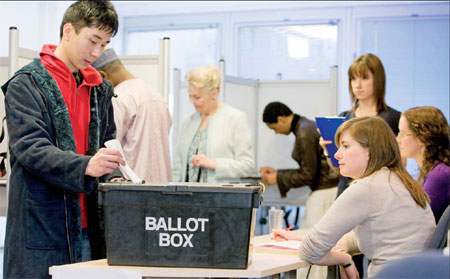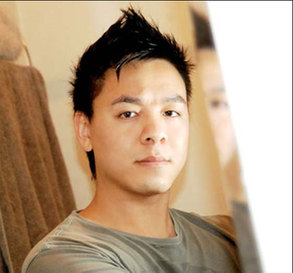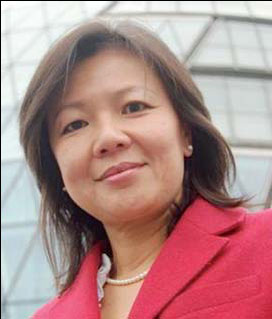Finding their political voice
Updated: 2012-02-10 10:26
By David Bartram (China Daily European Weekly)
|
|||||||||||
 |
|
The UK's Electoral Commission recently launched a campaign to encourage British-Chinese to vote in upcoming local and regional elections. Photos Provided to China Daily |
"If the Chinese catering industry collapsed then the impact is felt far beyond the Chinese community," says Wu. "That piece of legislation was being proposed without thinking about the consequences for the Chinese community.
"We started encouraging local restaurant and take-away owners to write letters to their MP raising their concerns. Eventually we got a meeting with the relevant minister and by the time the legislation was passed the language requirement was somewhat relaxed."
Such positive results from greater engagement are encouraging, but the big issue remains representation. Despite Chinese populations of more than 100,000 in France, the UK, the Netherlands, Italy, Germany and Spain, it is only in the Netherlands where there is anything approaching significant representation of ethnic Chinese immigrants in national government.
Explaining this under-representation is somewhat of a puzzle, particularly when considered next to the relative success of South Asian and Afro-Caribbean immigrant communities in European politics. Some point to Chinese communities' unwillingness to actively participate. Others argue that the political parties are not doing enough.
Merlene Emerson, who moved to London from Singapore in 1979, co-founded the Chinese Liberal Democrats in 2006 to help raise awareness of the party within the Chinese community.
"We try to communicate the party's ideas to the British-Chinese community while at the same time communicating the needs and aspirations of British-Chinese to our own colleagues and party leaders," says Emerson.
"I would say that with the change in China's role, British-Chinese have a greater level of self-confidence now. The news is no longer about illegal immigrants being smuggled in; it is now about China's economic growth.
"In the past there was almost an aversion to politics among the British-Chinese community, now they are slightly more open. People like (Assembly Member) Anna Lo in Northern Ireland have really helped to pave the way for the rest of us."
There is certainly a hope that the growing number of Chinese political role models will encourage the next generation to take a more active involvement. Mark Wu is helping this process via his website Visible Chinese.
 |
|
Mark Wu runs the website Visible Chinese, to compile a Who's Who for the Chinese community in Britain. |
"The idea with Visible Chinese was to compile a Who's Who for the Chinese community. I realized there wasn't anything that showcased people across the whole spectrum of society. There really wasn't a focus on the unsung heroes."
Visible Chinese provides biographies of members of the Chinese community across all sectors from politics to social work to acting. As well as celebrating achievements, the site shows young British-Chinese that they are not limited to the more traditional career paths.
"There is a perception that the path for a good second- or third-generation British-Chinese person is to go to school, study hard and get a job in accountancy, IT or something that is considered a professional role.
"When my generation was growing up, we saw a lot of people follow these quite 'geeky' career paths. If you wanted to go into the arts or politics or something that didn't seem very stable you were discouraged from it."
The impact of websites such as Visible Chinese on the further integration of the British-Chinese community into UK politics was examined by Miri Song, a professor of sociology at the University of Kent.
"The striking thing about sites such as Visible Chinese is that they are all about demonstrating links to the mainstream," says Song. "Some see the emergence of minority sites as an overtly inward move, but I say that to engage with the mainstream you need a sense of group consciousness and public presence first.
"Generally speaking, the second- and third-generation are highly professional and there is a lot of evidence that British-Chinese do want to get involved in politics. They don't regard it a contradiction to be committed to a minority group but also active in mainstream politics."
 |
|
Merlene Emerson co-founded the Chinese Liberal Democrats in 2006. |
This balance between representing a minority group and representing a constituency as a whole is still a sensitive one. In the 2008 Paris municipal elections, Felix Wu was criticized for openly campaigning along cultural grounds. The idea that Wu was campaigning to represent the city's Asian population did not sit well with those who believed that in doing so he would be failing his other constituents.
But it will likely be the disintegration of race-based politics that ultimately signals the true integration of the Chinese diaspora into European politics.
"I do think increasingly British-Chinese people aren't content to only engage in ethnically specific politics," says Song. "Now people are saying they want to run for a seat and it just so happens that he or she is British-Chinese. But such candidates are not going to run only on the basis of being Chinese, or cater only to Chinese interests and needs."
Archie Preston, author of research on Chinese involvement in British politics at the University of Cambridge, says that in the 2005 general election, there was only one Chinese candidate, yet five years later in the 2010 election there were eight.
And in 2010, Thomas Chan became the first Chinese mayor in Britain, while last year, Helen Chuah was inaugurated as mayor of Colchester, Preston adds. At the same time there are younger Chinese politicians coming through the ranks, among them Steven Cheung who ran for the European Parliament in 2009 at the age of 19.
Today's Top News
Rescuers race against time for quake victims
Telecom workers restore links
Coal mine blast kills 18 in Jilin
Intl scholarship puts China on the map
More bird flu patients discharged
Gold loses sheen, but still a safe bet
US 'turns blind eye to human rights'
Telecom workers restore links
Hot Topics
Lunar probe , China growth forecasts, Emission rules get tougher, China seen through 'colored lens', International board,
Editor's Picks

|

|

|

|

|

|





